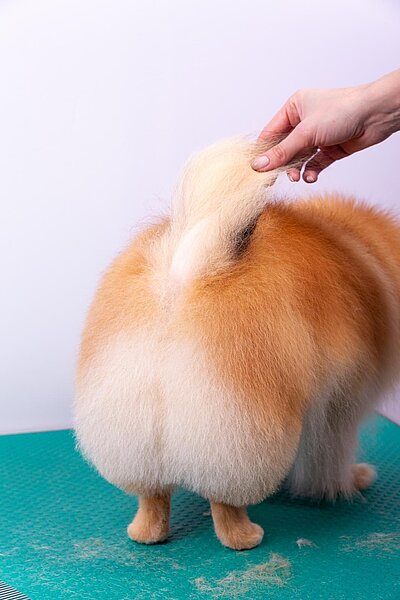Anal gland impaction

If you have a dog, you may have heard of the anal glands. These are two small glands located to the left and right of the anus. They produce an oily fluid that helps the dog to mark its territory and signal its identity. Normally, the anal glands empty themselves when the dog defecates. Sometimes, however, they can become blocked and lead to painful inflammation. This is called anal gland impaction.
Symptoms of an anal gland impaction
How can you tell if your dog has an anal gland impaction? There are a few signs that can indicate this, for example:
- The dog frequently licks or bites itself in the anus area.
- The dog slides its rear end across the floor (scooting).
- The dog shows pain or discomfort when defecating or sitting.
- The dog has an unpleasant odor in the area of the anus.
- The dog has a swelling or lump next to the anus.
- The dog has blood or pus in the feces or around the anus.
Causes of an anal gland impaction
There are various factors that can contribute to an anal gland impaction, for example
- A consistency of feces that is too soft or too hard, which does not sufficiently stimulate or clogs the glands.
- An anatomical feature that causes the glands to be narrow or deep.
- An allergy or infection that leads to inflammation of the glands.
- Obesity or lack of exercise that weakens the muscles of the anus.
- A hormonal disorder that affects the function of the glands.
Treatment of an anal gland impaction
If you suspect that your dog has an anal gland impaction, you should take him to the vet as soon as possible. The vet can examine the glands and express them if necessary. This means that they will gently press on the glands with their fingers to remove the fluid. This can be uncomfortable for the dog, but it usually relieves the discomfort immediately. The vet may also flush the glands to clean and disinfect them. If the glands are inflamed or infected, the vet may also prescribe antibiotics or painkillers.
Prevention of an anal gland impaction
There are a number of measures you can take to prevent an anal gland impaction, for example
- Feed your dog a high-quality food that ensures good digestion and promotes firm stools.
- Make sure your dog drinks enough and defecates regularly.
- Brush your dog regularly and keep the area around the anus clean and dry.
- Let your dog play and run around enough to strengthen its muscles.
- Have your dog regularly examined and vaccinated by the vet.
Anal gland impaction is a common condition in dogs, but it can be treated well. If you pay attention to the symptoms and provide your dog with good care, you can save him a lot of suffering and improve his quality of life.
The authors assume that a veterinarian should be consulted if an animal is ill and that medication should only be taken after consultation with a doctor or pharmacist. Only an individual examination can lead to a diagnosis and treatment decision.
We help you find the nearest vet → This way